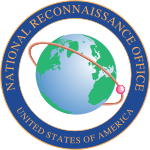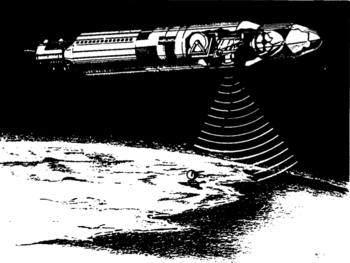- National Reconnaissance Office
-
National Reconnaissance Office
— NRO —Staatliche Ebene Bundesbehörde der Vereinigten Staaten Stellung der Behörde Militärnachrichtendienst Aufsichtsbehörde(n) Verteidigungsministerium der Vereinigten Staaten Gründung 1960/1961 Hauptsitz Chantilly (Virginia) Behördenleitung
Anzahl der Bediensteten ca. 3.000 Website www.nro.gov Das National Reconnaissance Office (NRO) ist ein 1960/61 gegründeter Militärnachrichtendienst der USA, der für das militärische Satellitenprogramm verantwortlich ist.
Inhaltsverzeichnis
Auftrag und Organisation
Die durch Satellitenaufklärung gewonnenen Erkenntnisse dienen verschiedenen Zwecken, wie der internationalen Rüstungskontrolle und Nuklearüberwachung, der Frühwarnung vor militärischen Ereignissen, der Terrorismusbekämpfung, aber auch der Vorbereitung eigener Einsätze.
Das Personal des NRO wird zum Großteil von Militär und der CIA gestellt. Die Kosten dieses Nachrichtendienstes tragen CIA und Verteidigungsministerium. Formell untersteht das NRO einem Direktor, der jedoch dem Direktor der CIA gegenüber weisungsgebunden ist.
Geschichte
Das NRO war bis Anfang der Neunziger Jahre eine so genannte „schwarze“ Organisation. Das heißt, dass sie offiziell nicht existierte und ihr Budget innerhalb des Verteidigungshaushaltes unter anderen Haushaltsposten versteckt wurde. Tatsächlich war sie Teil der Air Intelligence Agency, wie Victor Marchetti und John D. Marks in ihrem Buch CIA 1974 enthüllten. Innerhalb der AIA mit 2,7 Milliarden Dollar Budget machte das National Reconnaissance Office mit 1,5 Milliarden Dollar, das das Satellitenprogramm für die ganze US-Nachrichtengemeinde leitete und durchführte, den größten Anteil aus. Langjähriger Leiter des NRO war der Luftwaffenoberst und spätere Brigadegeneral Ralph Steakly. Inzwischen ist das NRO aus der AIA ausgegliedert und verselbstständigt.
Die Personalstärke des NRO wird auf ca. 3.000 Mitarbeiter geschätzt und unterliegt der Geheimhaltung.
Satelliten des NROs
Die Satelliten des NROs (Aufklärungssatelliten) werden nur mit der Bezeichnung NROL (National Reconnaisance Office Launch) und einer Startnummer versehen. Weitere Informationen zu den Satelliten gibt es meist nicht.
- Keyhole-Serie—optischer Satellit:
- KH-1, KH-2, KH-3, KH-4, KH-4A, KH-4B Corona (1959–1972)
- KH-5 Argon (1961–1962)
- KH-6 Lanyard (1963)
- KH-7 Gambit (1963–1967)
- KH-8 Gambit (1966–1984)
- KH-9 Hexagon und Big Bird (197–1986)
- KH-10—Dorian (aufgegeben)
- KH-11 Kennan und Crystal (1976–1988)
- KH-12 Ikon und Improved Crystal (1990-?)
- KH-13 Misty (1999-?)
- ELINT-Programm (1962–1971) setzte das Naval Research Laboratory's GRAB-Programm fort (1960–1961)
- Trumpet (1994-1997) SIGINT-Satellit
- Lacrosse/Onyx— Radar-Satellit (1988–)
- Vortex/Chalet (1978–1989) und Mercury (1994–1998)—SIGINT und COMINT
- Rhyolite/Aquacade (1970–1978), Magnum/Orion (1985–1990), und Mentor (1995–2010)—SIGINT
- Repeater
- Misty/Zirconic -- Stealth-IMINT
- NROL 16: 30. April 2005 mit Titan 4B-30 (Lacrosse F5)
- NROL 18: 2. Dezember 2003 mit Atlas IIAS (SBWASS F2)
- NROL 19: 9. September 2003 Titan 4B (MENTOR 3)
- NROL 20: 20. Juli 2005 mit Titan 4B (EIS-3 Keyhole 13)
- NROL 21: 30. September 2005 mit Delta II
- NROL 22: 30. August 2005 mit Delta IV Medium+ (Prowler 1)
- NROL 23: 3. Februar 2005 mit Atlas 3B (Satellit auch NOSS 3A und 3B genannt, Naval Ocean Surveillance System)
- NROL 24: 5. Oktober 2007
- NROL 26: 18. Januar 2009 mit Delta IV Heavy
- NROL 32: 17. November 2010 mit Delta IV Heavy
- NROL 49: 20. Januar 2011 mit Delta 4 Heavy (wahrscheinlich Satellit der Keyhole Serie)
- NROL 27: 11. März 2011 mit einer Delta 4 Medium+ (wahrscheinlich ein Kommunikationssatellit für das Satellite Data System)
- NROL 34: 15. April 2011 (14. April nach Ortszeit) mit einer Atlas V in einen niedrigen Orbit (wahrscheinlich Radarsatellit)
Vergleichbare Organisationen in Deutschland
- Kommando Strategische Aufklärung, größtes Kommando der Bundeswehr und zuständig für sämtliche Maßnahmen der strategischen Informationsgewinnung, darunter insbesondere die Satellitenaufklärung mittels SAR-Lupe
Weblinks
- Homepage des NRO (englisch)
- Gunter's Space Page: NROL launches (englisch)
Einzelnachweise
- ↑ a b c NRO - Leadership. In: www.nro.gov. NRO, abgerufen am 12. April 2011.
Schlagen Sie auch in anderen Wörterbüchern nach:
National Reconnaissance Office — Agency overview Formed 1961 Headquarters Chantilly, Virginia … Wikipedia
National Reconnaissance Office — 38°52′55″N 77°27′01″O / 38.88194, 77.45028 … Wikipédia en Français
National Reconnaissance Office — noun an intelligence agency in the United States Department of Defense that designs and builds and operates space reconnaissance systems to detect trouble spots worldwide and to monitor arms control agreements and environmental issues and to help … Useful english dictionary
Leadership of the National Reconnaissance Office — The Director of the National Reconnaissance Office (DNRO) of the United States is responsible to the Secretary of Defense and the Director of National Intelligence for all national space and assigned airborne reconnaissance activities. The DNRO… … Wikipedia
Chronology of the National Reconnaissance Office — Contents 1 Events 1.1 1950 1959 1.2 1960 1969 1.3 1970 1979 1.4 1980 1989 … Wikipedia
National Applications Office — Sceau du département de la Sécurité intérieure. Le National Applications Office (NAO) est un programme du Département de la Sécurité intérieure des États Unis créé en mai 2007 par l administration Bush. Il est destiné à mettre à la disposition… … Wikipédia en Français
National Reconnaissance Office — A Department of Defense agency tasked to ensure that the United States has the technology and spaceborne and airborne assets needed to acquire intelligence worldwide, including support to such functions as monitoring of arms control agreements,… … Military dictionary
National Underwater Reconnaissance Office — The National Underwater Reconnaissance Office (NURO) is the “hidden younger brother” of the National Reconnaissance Office (NRO). NRO was initiated in 1960 and developed as a common office for United States Air Force and the Central Intelligence… … Wikipedia
National Reconnaissance Operations Center — The United States National Reconnaissance Operations Center (NROC) is the focal point for the National Reconnaissance Office s current operations and for time sensitive space borne intelligence reporting for the United States Intelligence… … Wikipedia
National Applications Office — The National Applications Office was a United States Department of Homeland Security program that provides local, state, and federal officials with extensive access to spy satellite imagery.[1] It has access to military satellites to observe the… … Wikipedia
- Keyhole-Serie—optischer Satellit:


